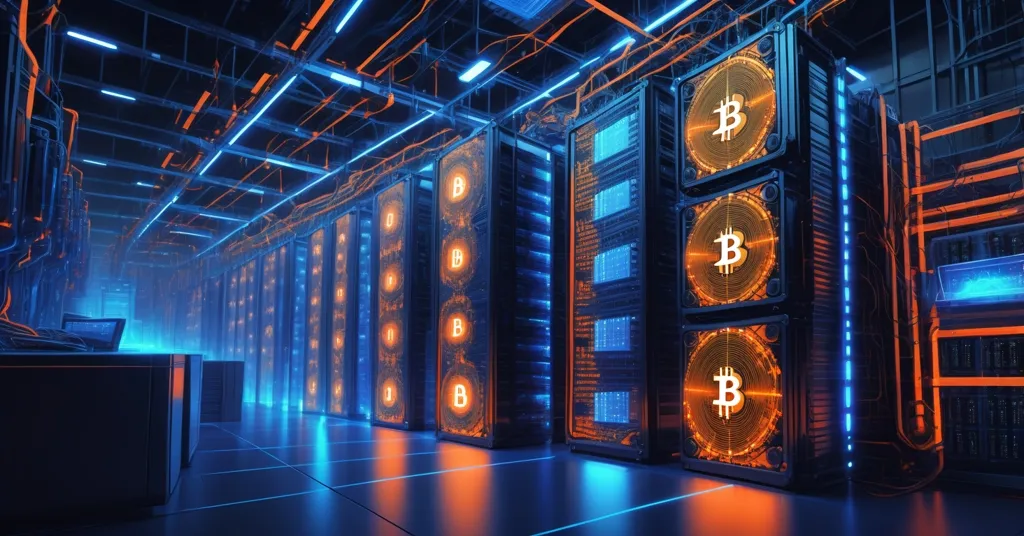Dell’s $25B AI Server Boom: Impact on Bitcoin Mining and Decentralization

Dell’s $25 Billion AI Server Surge: A Boon or Burden for Crypto and Decentralization?
Dell Technologies Inc. is capitalizing on the explosive demand for artificial intelligence infrastructure, raising its annual AI server shipment forecast from $20 billion to a hefty $25 billion. With an $18.4 billion backlog and fierce competition heating up, Dell’s journey reveals both the promise and the pitfalls of this tech boom—pitfalls that could ripple into the crypto space, including Bitcoin mining and decentralized computing.
- AI Powerhouse: Dell logs $12.3 billion in Q3 AI server orders, ships $5.6 billion, and boosts yearly forecast to $25 billion.
- Financial Edge: Sales climb 11% to $27 billion, earnings beat expectations at $2.59 per share, but costs threaten margins.
- Crypto Connection: AI hardware trends could impact Bitcoin mining costs and decentralized computing’s future.
Dell’s AI Server Explosion: Numbers That Dazzle
The AI revolution is reshaping the tech landscape, and Dell is planting itself firmly at the forefront. For the fiscal third quarter ending October 31, the company racked up a staggering $12.3 billion in AI server orders, shipping out $5.6 billion worth of gear. That leaves a backlog of $18.4 billion—essentially, a mountain of demand they’re scrambling to fulfill, as noted in their recent annual AI server outlook update. Year-to-date, orders have hit an unprecedented $30 billion, a figure that prompted Chief Operating Officer Jeff Clarke to highlight the sheer velocity of this growth.
“AI momentum is accelerating in the second half of the year,” leading to “an unprecedented $30 billion in orders year to date.” – Jeff Clarke, Chief Operating Officer, Dell Technologies
Financially, Dell is flexing some serious muscle. Total sales for the quarter jumped 11% to $27 billion, just shy of the $27.2 billion analysts expected, but earnings per share landed at $2.59, topping the forecast of $2.48. The infrastructure unit, which includes the AI server business, posted operating margins of 12.4% (the profit percentage after direct costs of making and selling these servers), beating estimates of 11.2%. Even the overall gross margin hit 21.1%, above the anticipated 20.4%. Looking ahead, Dell revised its full-year outlook, projecting earnings of $9.92 per share on sales of $111.7 billion, up from earlier estimates of $9.55 per share and $107 billion. Meanwhile, their commercial PC segment grew a modest 5% to $10.6 billion but missed consensus targets, showing not every part of the business is soaring.
What’s driving this frenzy? It’s the global data center boom. Giant cloud providers—think Amazon Web Services, Microsoft Azure, or Google Cloud, often called hyperscalers—and enterprises are dumping resources into systems that can train and run complex AI models. These setups demand specialized hardware, and Dell is racing to deliver. But here’s the kicker: $30 billion in orders sounds impressive as hell, but can they keep up without tripping over their own supply chain?
The Costly Catch: Skyrocketing Expenses Threaten the Party
Before we get too starry-eyed over Dell’s numbers, let’s talk about the elephant in the room: costs. The price of critical components like memory chips (DRAM) and GPUs—think NVIDIA’s high-end cards—is climbing fast, and it’s a damn thorn in Dell’s side. These aren’t just minor bumps; they’re industry-wide pressures jacking up the cost basis across all products. Jeff Clarke didn’t sugarcoat it, admitting that no one, not even Dell, is immune to these hits.
“We’re going to do everything we can to minimize the impact. But the fact is, the cost basis is going up across all products. No one is more unique than others.” – Jeff Clarke, Chief Operating Officer, Dell Technologies
For those new to the hardware grind, here’s the deal: when hyperscalers order thousands of servers, they expect competitive pricing. If Dell’s costs keep spiking—some analysts predict another 15% rise in component prices through 2024—they’re stuck between a rock and a hard place. Do they absorb the hit and shrink margins, or pass it on and risk losing market share? It’s a brutal balancing act, especially when profitability is already under the microscope. Sure, their infrastructure margins beat expectations, but how long can that hold if supply chain chaos keeps escalating?
On the leadership front, Dell is trying to steady the ship. David Kennedy, previously interim Chief Financial Officer, has been named to the role permanently. His mission is clear: navigate this growth spurt while keeping costs from derailing the gravy train. Wall Street seems cautiously optimistic—Dell shares nudged up 2% in extended trading after the Q3 results, closing at $125.92 with a year-to-date gain of 9.3%. Not a rocket launch, but a nod that investors see potential in this AI pivot—if they can dodge the landmines.
Competition Heats Up: Dell Isn’t Alone in the AI Race
Dell isn’t the only player digging into this vein of tech riches. Competitors like Super Micro Computer and Hewlett Packard Enterprise (HPE) are also cashing in on the AI data center surge. Super Micro, for instance, has been gaining ground with aggressive pricing and custom solutions for hyperscalers, while HPE is leaning into hybrid cloud offerings to carve out its niche. Market research suggests global AI server spending could balloon to $200 billion annually by the decade’s end. That’s not just a trend; it’s a tectonic shift in how computing infrastructure is built and scaled.
But let’s cut through the hype. A $200 billion projection sounds sexy, but it’s a pipe dream if supply chains keep imploding or if regulatory heat—like energy consumption crackdowns on data centers—starts biting. Dell, Super Micro, and HPE are all in the same boat, paddling hard against rising costs and cutthroat competition. Dell’s legacy in servers gives it an edge, but in a market this hot, even the biggest names can get scorched if they misstep. And speaking of energy concerns, doesn’t this sound familiar to anyone tracking Bitcoin mining debates? More on that in a moment.
Crypto’s Hidden Stake in AI Hardware: A Double-Edged Sword
Now, let’s pivot to why this matters to our Bitcoin and blockchain crowd. At first glance, Dell’s AI server saga might seem like a distant tech story, but there’s a direct overlap with crypto—particularly for Bitcoin miners and decentralized computing projects. The high-performance hardware powering AI data centers often mirrors what miners use to hash for BTC. Hashing, for the uninitiated, is the process where miners deploy powerful machines to solve complex math puzzles, securing the Bitcoin network and earning rewards. A single mining rig might not rival a hyperscaler’s setup, but scale up to a mining farm, and the hardware needs start looking awfully similar.
Here’s where it gets sticky: if AI demand keeps pushing component costs skyward—GPUs and memory chips, especially—it’s not just Dell feeling the pinch. Bitcoin miners, already on razor-thin margins due to halving events and energy costs, could see hardware prices spike further. Small-scale miners might get priced out entirely, centralizing mining power in the hands of big players with deep pockets. That’s a direct threat to Bitcoin’s decentralized ethos, something us maximalists hold dear. Could Dell’s AI boom inadvertently undermine the very freedom and autonomy Bitcoin stands for?
Flip the coin, though, and there’s potential upside. The innovation driving AI servers—faster processors, better cooling, energy efficiency—could trickle into mining hardware, making operations more sustainable. Plus, decentralized AI projects on blockchains like Ethereum, or newer players like Akash Network and Render Token, are starting to bridge AI workloads with distributed computing. These setups let users rent out spare computing power via blockchain, sidestepping centralized giants. If Dell and others push the envelope on server tech, could this empower truly decentralized networks? Or will it just fatten the wallets of Big Tech, leaving crypto innovators scraping for leftovers?
Don’t expect Dell to start churning out Bitcoin mining rigs anytime soon, but the overlap is hard to ignore. As a Bitcoin maximalist, I’m wary of centralized hardware giants dictating the pace of innovation. Yet, as a champion of effective accelerationism, I can’t help but root for tech that disrupts the status quo—even if it’s messy. The question is whether this AI server surge will bolster the fight for privacy and freedom in computing, or simply reinforce the old guard under a shiny new label.
Looking Ahead: Balancing Boom with Reality
Dell’s trajectory in the AI server space is a microcosm of tech at a crossroads. The potential is mind-blowing—$25 billion in shipments, $30 billion in orders, a market poised to hit $200 billion. But the risks are just as real. Supply chain disasters, cutthroat competition, and looming regulatory hurdles (like data center energy critiques that echo Bitcoin mining battles) could trip up even the savviest players. Dell’s ability to scale without choking on costs will be the true test of their mettle.
For our crypto community, this isn’t just a spectator sport. The hardware trends shaping AI could make or break Bitcoin’s accessibility and blockchain’s push for decentralization. If costs keep climbing, small miners and indie projects might get squeezed out. Yet, if innovation accelerates, we could see tools that empower peer-to-peer systems like never before. So, here’s the big question: will Dell and the AI hardware race pave the way for a freer, more autonomous digital future—or just build taller walls for centralized power to hide behind?
Key Takeaways and Questions for Crypto Enthusiasts
- What’s fueling Dell’s massive AI server demand?
Giant cloud providers and enterprises are building data centers to run complex AI models, requiring specialized hardware that Dell is racing to supply with $12.3 billion in Q3 orders alone. - How is Dell performing financially in this AI boom?
Sales rose 11% to $27 billion, earnings hit $2.59 per share (beating forecasts), and the annual AI shipment forecast jumped to $25 billion, though costs are a growing concern. - What challenges could derail Dell’s AI server growth?
Skyrocketing costs for memory chips and GPUs are squeezing margins, an industry-wide issue that could worsen with predicted 15% price hikes in 2024. - How does Dell compare to competitors in the AI hardware race?
Super Micro Computer and HPE are also thriving, chasing a market that could reach $200 billion annually by decade’s end, though all face supply chain and regulatory risks. - Why should crypto fans care about AI server trends?
Rising hardware costs could hit Bitcoin miners hard, potentially centralizing power, while innovations might boost decentralized AI on blockchains—if Big Tech doesn’t hog the benefits. - Can AI infrastructure align with Bitcoin’s decentralization ethos?
It’s a long shot; centralized giants like Dell prioritize profit over freedom, but tech advancements could still spill over to empower peer-to-peer systems if leveraged right.



